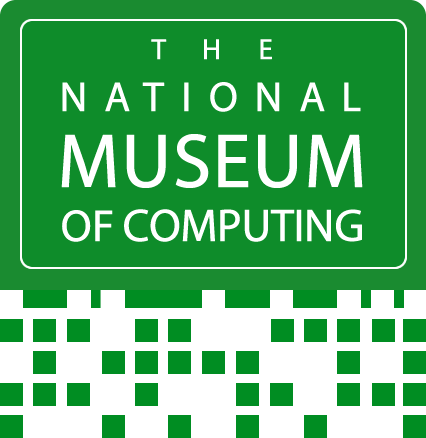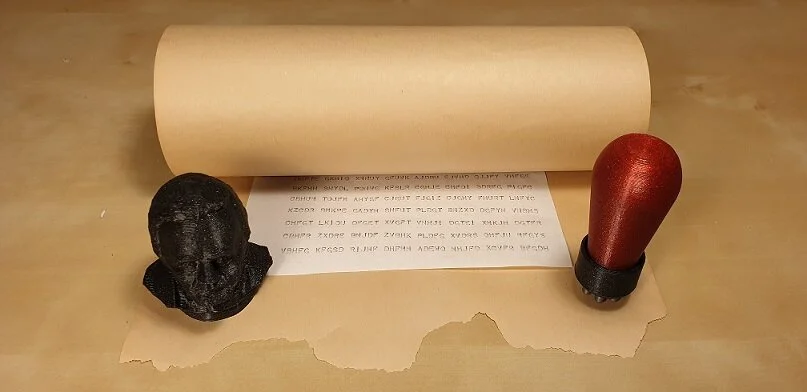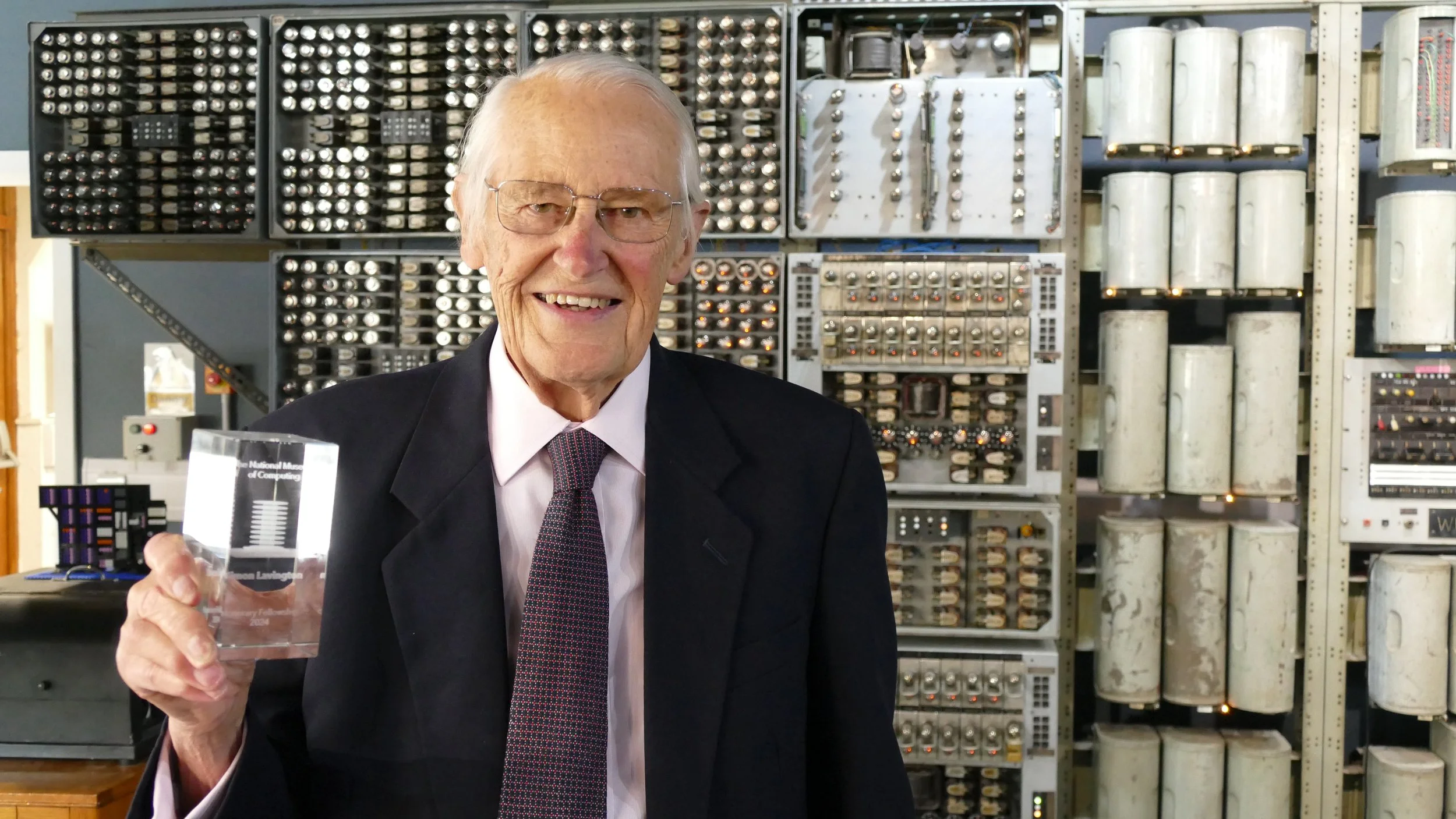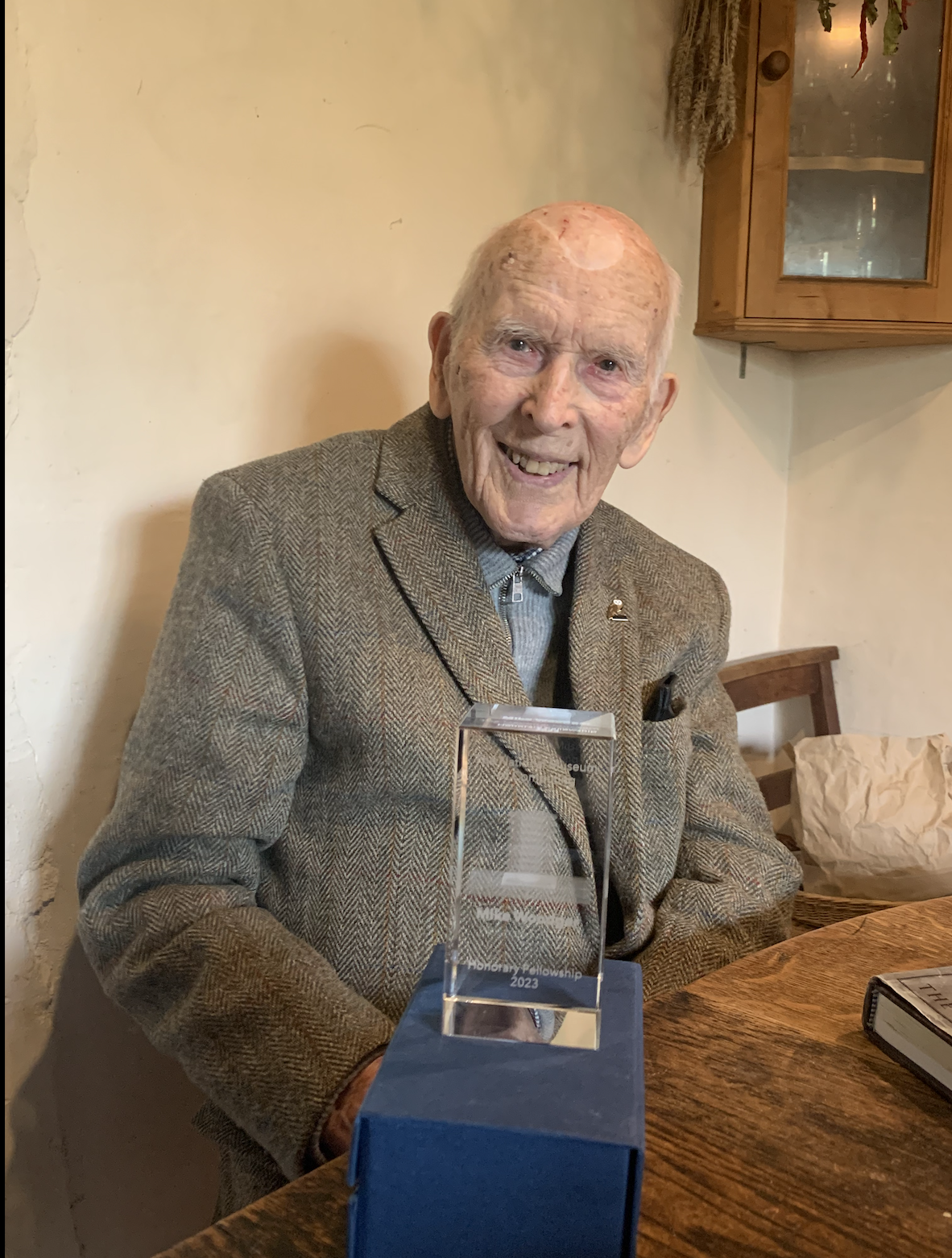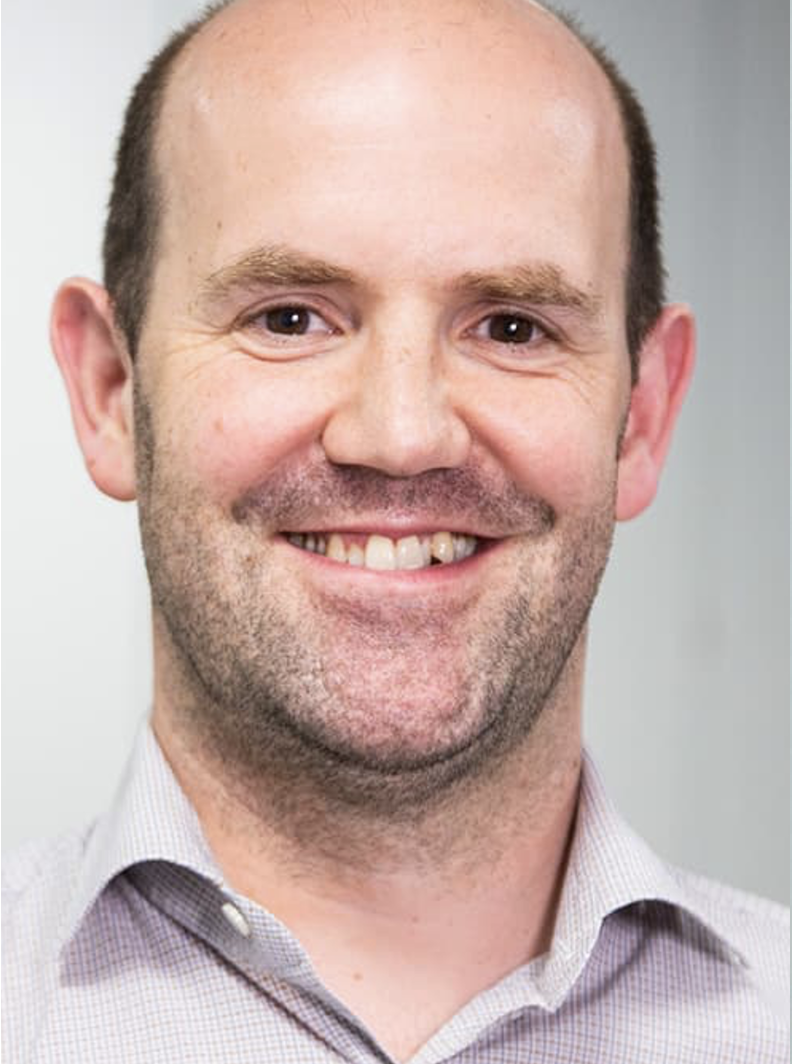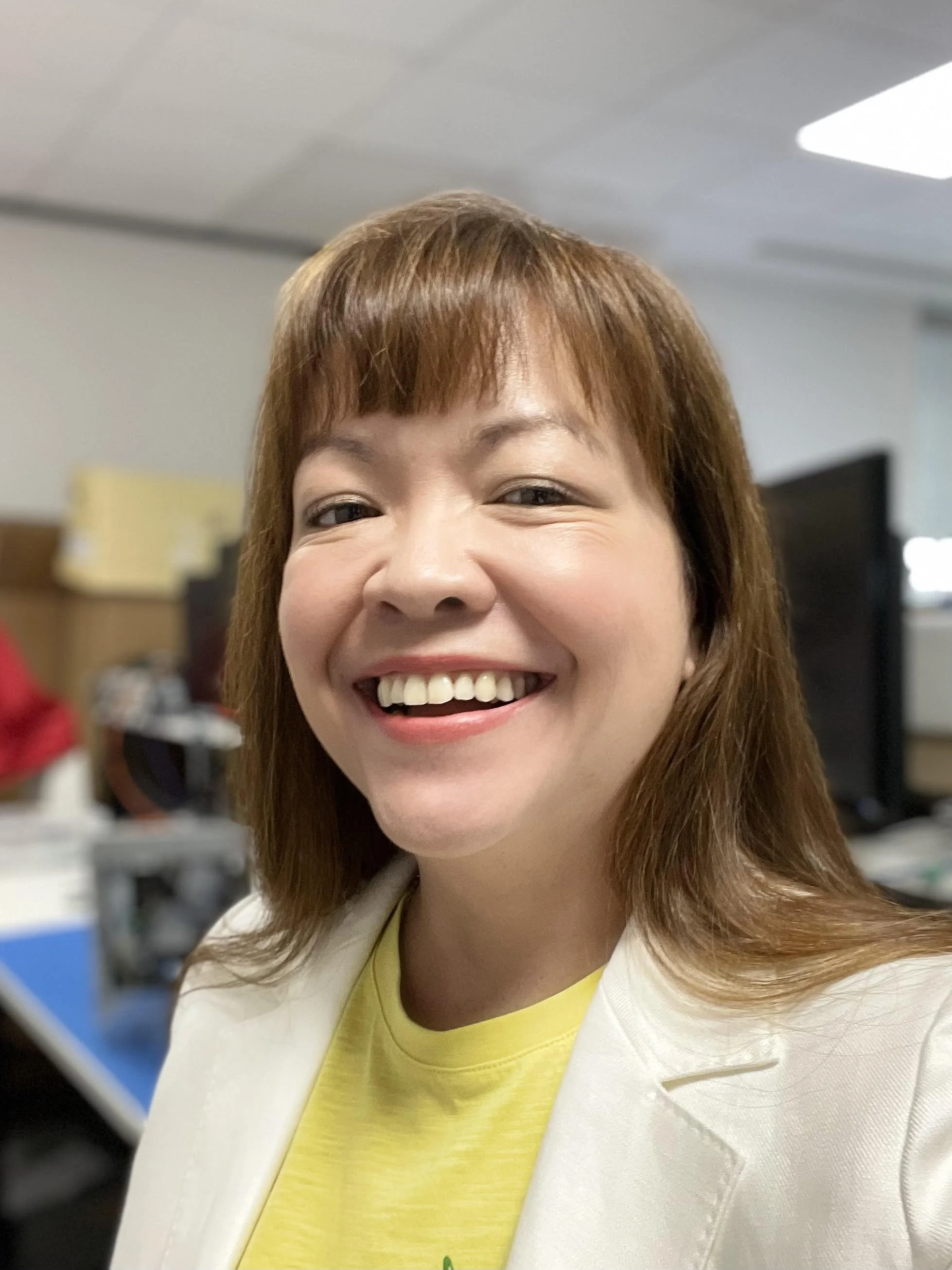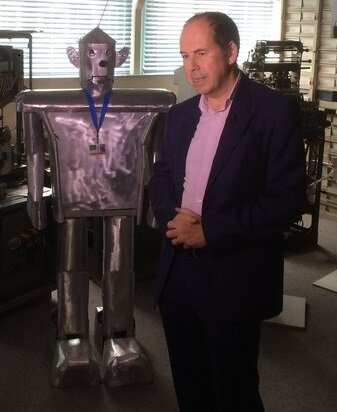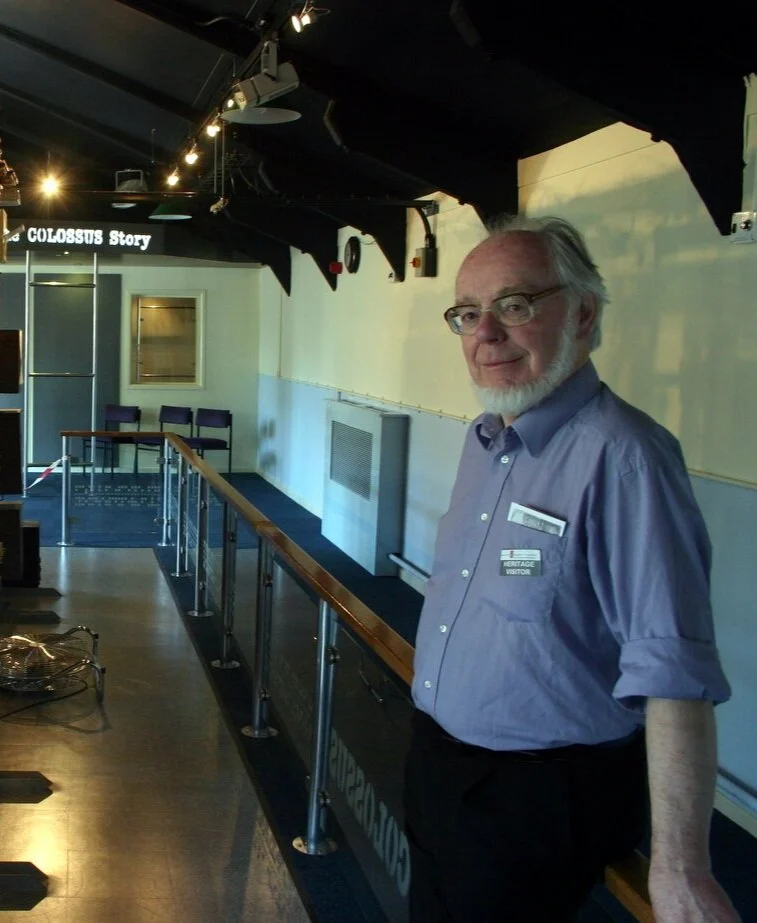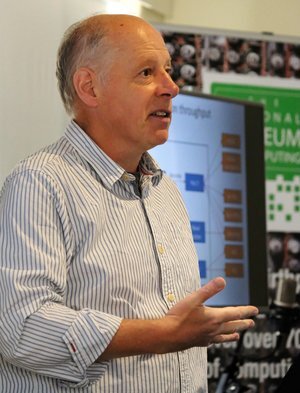Honorary Fellows
The individual Honorary Fellowships recognise outstanding contributions in computing and computing history. The Fellowship Honours Board, in the shape of an oversized punched card, is in the Colossus Gallery.
2024
Simon Lavington
Simon Lavington, M.Sc., Ph.D., FIEE, FBCS, C.Eng - an Emeritus Professor in the Department of Computing and Electronic Systems at the University of Essex - was awarded an Honorary Fellowship of the Museum in 2024.
Simon’s academic journey commenced with an Electrical Engineering degree from Manchester University in 1962. Following this, he embarked on pioneering research in automatic speech recognition utilising the Atlas supercomputer, leading to a Ph.D. Subsequently, he contributed significantly as a member of the design team for the groundbreaking Manchester University high performance MU5 computer.
Moving to the University of Essex in 1986, as Professor of Computer Science, Lavington’s research specialised in Systems Architecture principally centred on advancing hardware and software for parallel information processing. He led the Alvey Programme-funded Intelligent File Store (IFS) project, which was granted a British Computer Society Silver Medal for Technical Achievement. The IFS project was completed in 1996, after which he worked on parallel techniques for Knowledge Discovery in Databases ('data mining') and interactive video over congested IP networks.
Following retirement in July 2002, Lavington redirected his energies towards writing about computer history, a passion he began in 1970 and continues to this day. He has authored numerous journal articles and books on the history of computing with a focus on early British computers during the period 1945 to 1970. Notable titles include: “Early British Computers”, “The Pegasus Story” and “Moving Targets: Elliott Automation and the Dawn of the Computer Age in Britain 1947-67” and “Early computing in Britain: Ferranti Ltd. and government funding, 1948 – 1958”.
2023
Mike Woodger
In April 2023, The National Museum of Computing (TNMOC), home to the world’s largest collection of working historic computers, announced that pioneering computer scientist Mike Woodger - a driving force behind modern computer programming languages and software engineering - has been made a TNMOC Honorary Fellow for his pivotal role in helping to shape modern British computing.
With a career spanning decades, Mike - who celebrated his 100th birthday last month - was a key contributor to the development of two landmark computer programming languages, Algol 60 and Ada. He and his fellow contributors created concepts to enable the construction of safe and reliable software systems and to make it easier for one programmer to build on the work of another, composing complex software systems out of reusable modules.
Among Mike’s many accomplishments:
With his Colleagues Enabled the practical application of Pilot ACE, one of Britain’s first digital computers that was designed by Alan Turing and built at The National Physical Laboratory. Mike worked closely with Turing on ACE and wrote a suite of sophisticated mathematical routines to solve difficult scientific problems. His routines allowed application programmers to code for the problem they wanted to solve - helping them work faster and more efficiently.
Part of the team that created Algol 60. This was the first programming language to introduce the concepts of structured programming and procedures, such as data types and recursion, found in popular languages today like Java and Python. These features help developers to build safe, secure and reliable large-scale software systems.
Led the design of Green that became Ada - an advanced programming language deployed widely in mission-critical, embedded systems and adopted as a standard by the US Department of Defense. Ada added concepts to the idea of Algol that included building large systems out of reusable software modules and the ability to execute and coordinate multiple tasks concurrently. These ideas are present in all today’s major programming languages.
Became known as a “technical writing artist” following his work as a principal author and editor of the defining documents for both Algol 60 and Ada.
2022
Eben Upton
In December 2022, Eben Upton was awarded an honorary fellowship by the museum.
Eben co-founded the Raspberry Pi Foundation in 2008, and has led Raspberry Pi since its formation as a then wholly-owned subsidiary of the Foundation in 2012.
He was previously a Distinguished Engineer in the mobile and set-top-box business units at fabless semiconductor vendor Broadcom, specialising in ASIC architecture. In his earlier career, he founded the BAFTA award-winning game studio Ideaworks3D; held the post of Director of Studies for Computer Science at St John's College, Cambridge; and wrote the Oxford Rhyming Dictionary with his father, Professor Clive Upton.
He is the proud owner of a decommissioned EF36 valve from TNMOC's Colossus rebuild. As a former colleague of Professor Sir Maurice Wilkes at St John's College, and a tenant of the College's Maurice Wilkes Building, he is never happier than when poking (carefully) around the EDSAC rebuild which is currently underway at the museum.
He was appointed Commander of the Order of the British Empire (CBE) for services to education and business in the Queen’s Birthday Honours in 2016; elected to the Fellowship of the Royal Academy of Engineering in 2017; appointed a Distinguished Fellow of the British Computer Society in 2019; and appointed to Honorary Fellowships of the Institution of Engineering and Technology, and of St John’s College, Cambridge in 2020.
Eben is a recipient of the Royal Academy of Engineering’s MacRobert Award, and of the Institute of Electrical and Electronics Engineers’ Masaru Ibuka Consumer Electronics Award. He holds a BA in Physics and Engineering, a PhD in Computer Science, and an MBA, from the University of Cambridge.
Liz Upton
In December 2022, Liz Upton was awarded an honorary fellowship by the museum.
Liz is one of the founders of Raspberry Pi. She has led the communications function at Raspberry Pi since 2011, before the launch of the original Raspberry Pi. An award-winning former journalist and editor, she has more than 20 years of experience in publishing and PR.
Liz has worked for Penguin Random House, National Geographic, Channel 4 and Tribal Group; she used to run one of the UK’s most popular food blogs, and worked on food and travel copy and PR for a wide range of clients including the Irish Tourist Board and Celebrity Cruises.
Alongside working at Raspberry Pi, Liz is a Trustee of the UK’s Centre for Computing History, and has been elected an Honorary Fellow of the National Museum of Computing. She holds a Masters degree in Law from the University of Cambridge.
2021
Rory Cellan-Jones
In September 2021 the journalist and technology broadcaster, Rory Cellan-Jones was awarded an honorary fellowship by the museum recognising his significant, and quality contribution to advancing public knowledge and understanding of the history, culture, science, technology, and practice of computing.
Rory Cellan-Jones spent his entire journalistic career at the BBC, originally as a researcher, followed by reporting on business and economics before moving into technology and has had a front row seat to the most pressing tech news for over 40 years. As such he has been pivotal in the reporting of these stories; from the dot com crash and the rise of online retailing, to the cultural impact of the internet and more recently the impact the pandemic has had on the technology industry.
In 2021, he published his second book, 'Always On: Hope and Fear in the Social Smartphone Era' that charts recent computer history, from the launch of the revolutionary Apple iPhone in 2007, through the rise of social media and the technology giants, to today's dependence on smart devices.
As a long-term advocate for a greater focus on technology education, Cellan-Jones also donates his time to 'Speakers for Schools,' a charity which aims to end educational inequality to young people through providing talks from today's most influential figures. As part of this programme, he is known for his engaging talks on modern computing issues such as security and fake news, while also engaging with students over the pros and cons of gaming consoles and showcasing innovative technologies.
2020
Professor Brian Randell
In January 2020, Professor Brian Randell, distinguished computer scientist and computer historian, was awarded an honorary fellowship by the museum.
A distinguished computer scientist and computer historian, his research led to the innovation, power and importance of Colossus becoming public knowledge in the 1970s. His revelations about the Second World War code-breaking machine at the USA Los Alamos computer history conference in 1976 were described at the time as “a major historical bombshell” and caused a significant rewriting of the history of computing.
Now an emeritus professor at Newcastle University – and still a senior research investigator – Professor Randell’s scientific career has taken on dependable computing, operating systems for networked computers, and the security of distributed systems.
2019
Margaret Dorothy Sale
(1932 - 2020)
In June, 2019, Margaret Sale became the first honorary fellow of The National Museum of Computing in recognition of her outstanding service to the memory of the achievements of the wartime codebreakers of Bletchley Park.
Margaret Sale joined the TNMOC Board in 2011 and has had an association with the museum since its inception.
Margaret trained as a school teacher in the post-war years and brought up a family with her husband, the late Tony Sale (who later led the Colossus Rebuild team). Margaret’s interest in Bletchley Park and cryptography was awakened by talking to the veterans in the run-up to the Save Bletchley Park campaign in 1992 and became one of the movement’s first members.
Subsequently, Margaret became a founder member of the Bletchley Park Trust, joining its Board 1994 and serving for six years. In 2012, she won the Sunday Telegraph / Waitrose British Volunteer Awards for her work with Bletchley Park Trust.
A supporter of The National Museum of Computing since its inception, Margaret is keen to progress her late husband’s dream for the museum. Margaret is also President Emeritus for the The National Museum of Computing Members' Club.
Margaret died in March 2020, but her legacy will continue through the volunteers and staff at the museum.
Anthony Edgar (Tony) Sale, FBCS
(1931 - 2011)
In June, 2019, Tony Sale was posthumously awarded an honorary fellowship.
Tony Sale’s interest in computer restoration work blossomed in the late 1980s while working at the Science Museum. In 1989, he helped to set up the Computer Conservation Society as a joint venture between the British Computer Society and the Science Museum.
In 1991, with his wife Margaret and a small group of colleagues, Sale started the ultimately successful campaign to save Bletchley Park for the nation and subsequently became a founder member of the Bletchley Park Trust. Two years later, in recognition of the work carried out at Bletchley Park during World War II, Sale began the Colossus Rebuild Project, a daunting and hugely complex task to recreate the world’s first modern computer, which he and the team achieved in 2007.
Tony was one of the co-founding trustees of the National Museum of Computing in 2005.
He died in August 2011, but his legacy lives on. Without Tony, The National Museum of Computing probably would not exist today.
Research Fellows
Dr Mark Priestley
Senior Research Fellow Dr Mark Priestley joined the museum in 2019 to enhance the museum's understanding of the history of early computing and the development of programming languages.
He has been a researcher in the history of computing for many years after obtaining his first degree in mathematics and philosophy from the University of Oxford, an MSc in database and information systems from Birkbeck College and a PhD in Science and Technology Studies on logic and the development of programming languages.
His interests include the early history of computing in the UK, the development of programming languages, and the work of John von Neumann. He has published numerous articles and books on the history of computing, including "A Science of Operations: Machines, Logic and the Invention of Programming" (2011) "ENIAC in Action: Making and Remaking the Modern Computer" (2016, with T. Haigh and C. Rope), and "Routines of Substitution: John von Neumann's Work on Software Development, 1945-1948" (2018). A project on the Colossus code-breaking machine led to the articles "Colossus and Programmability" (2019), which was awarded the 2019 Bernard S Finn History Prize, and "Contextualizing Colossus" (2020).
Dr Elisabetta Mori
Dr Elisabetta Mori is a researcher and historian of computing. She is a Juan de La Cierva postdoctoral research fellow (2024-2026), Universitat Pompeu Fabra, Barcelona. She holds a MSc in Architecture, University of Florence, Italy, and a PhD in History and Philosophy of Computing at Middlesex University, London.
The focus of her academic research is the history of computing in Europe, with a special interest in the computing industry in the 1950s and 1960s. Her recent research delves into the history of Human-Computer Interaction in Britain.
She is an associate editor of the IEEE Annals of the History of Computing and she has published her research in a variety of venues: peer-reviewed journals and books, in international magazines like IEEE Spectrum, in the Oxford Dictionary of National Biography; and in newspapers like The Guardian.
She was a member of the French ANR funded project PROGRAMme and a visiting scientist at Software Heritage, Paris. She is a member of the IEEE Computer Society History Committee. She is currently a member of the Modern History of Mathematics Programme at the Isaac Newton Institute for Mathematical Sciences, Cambridge.
She is a professional oral history interviewer, trained at the 2016 ACM Workshop on the Oral History of Computing, University of North Carolina. She has researched and undertaken 80+ interviews with computing pioneers and practitioners, for several research projects in Italy, UK, France, and USA. Her collaborations include the Pisa Museum of Computing Machinery, where she also co-authored the podcast Pionieri dell’informatica.
Her research on the LEO Computers shows how the emergence of business computing linked mathematical research and office management practices, impacting both the emerging field of computer science and business methods, increasing the efficiency of processes. The case study of ELEA 9003 in Italy, the first Olivetti mainframe computer series, demonstrated the close relationship between industrial design, semiotics, HCI, and the history of computing.
